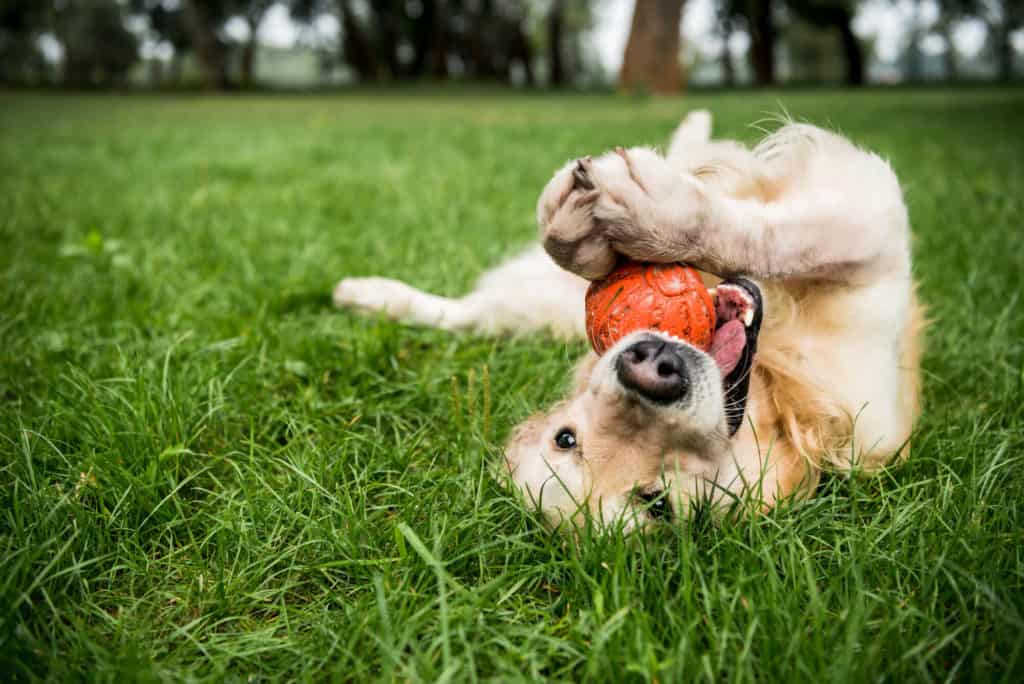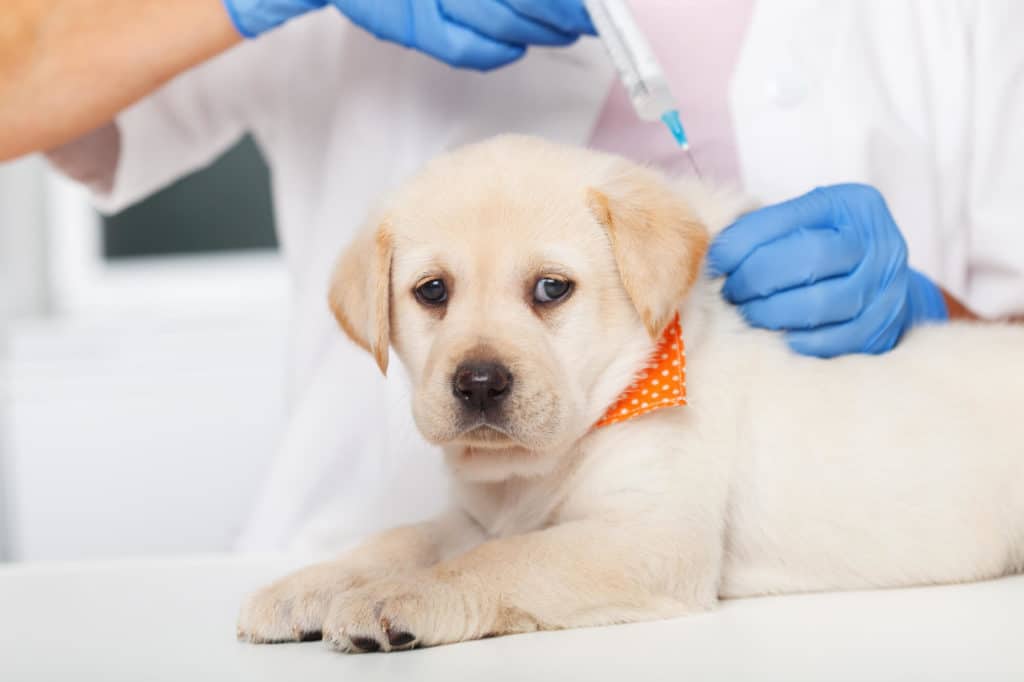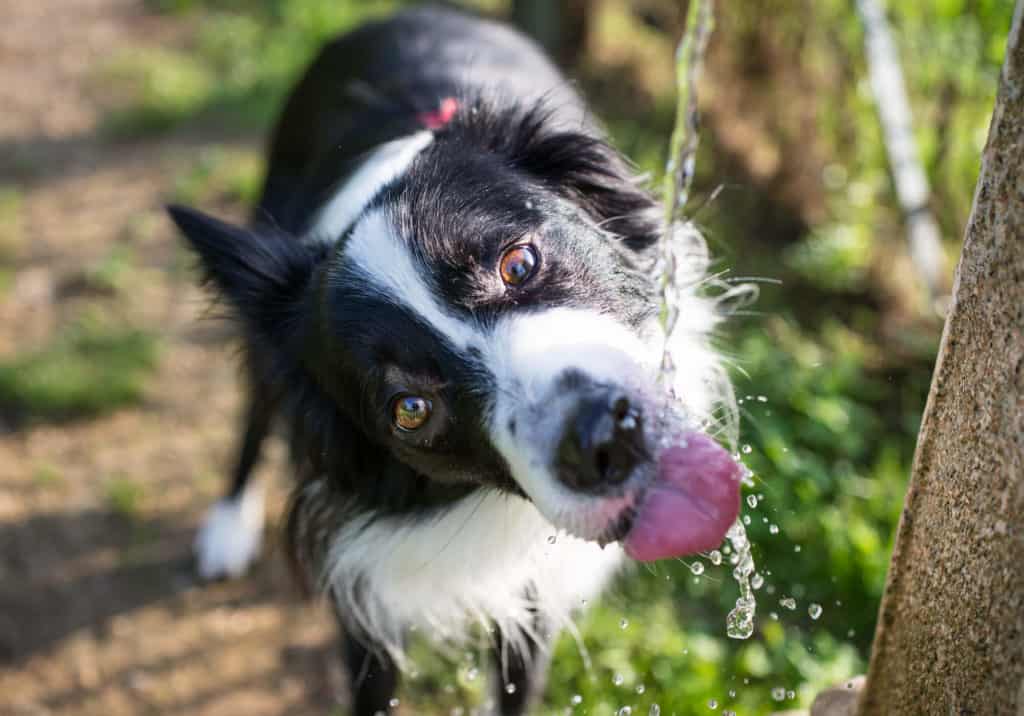It’s possible for a puppy to get a parvo infection from grass, either directly or indirectly.
With a high mortality rate, the canine parvovirus (CPV) infection can be a ticking time bomb for every dog owner. Unfortunately, knowing that disease transmits through common surfaces doesn’t make the situation less stressful.
So, how can puppies get parvo from grass, and what can you do about it? Let’s find out!
How Can Puppies Get Parvo From Grass?
CPV mainly transmits between dogs through the oral-fecal route. That’s why some people might think their pup is safe if he goes nowhere near other dogs’ excreta.
However, that’s not always the case.
Even small traces that linger on the grass can pass on the infection, especially to younger and more curious dogs.
Here’s how:
1. Infected Dog Defecates on the Grass
The process starts when an infected dog deposits the parvovirus on the grass through fecal matter.
This process can happen if a neighborhood dog visits your lawn for a nature’s call. Plus, the infection is also common in public spaces, especially parks.
Keep in mind that infected canines can spread the disease from day one of contracting it. With an incubation period of 3-7 days, you won’t even know they’re ill at that point!
2. Disease Transmits From the Grass to Your Puppy

Once the feces contaminate the grass, there are two ways that your pooch can get parvo; directly and indirectly.
Direct Contact
The most common route of infection here is the direct one.
Because dogs are curious little things, they might go up to the excreta to examine it. Basically, all it takes is a couple of sniffs and a lick to pass on parvo to your poor pup.
Indirect Contact
Even if you keep your pup off the lawn, there’s still a possibility that he’ll get parvo from the grass.
That’s because you might unintentionally act as a bridge for disease transmission.
Imagine you touching the contaminated surface and don’t wash your hands thoroughly. Then, you could pass on the virus while feeding your dog or playing with him.
Helpful Dog Health Resource:
Note: Our Health is #1 Priority. It should be no different for your dog. But you need to help him. The Ultimate Guide to Dog Health is the answer. This handy guide will help you recognize the symptoms of the health problems above. Get the knowledge to stay ahead of these terrible issues that can rob your lovely dog from vigor and life. Help your friend make it to 14 yrs+ without pain and suffering.
How Long Does Parvovirus Survive on Grass?
Despite their tiny size, parvovirus particles are actually pretty resilient. The CPV traces can survive for months on end outdoors.
However, sunlight can reduce the virus’ vitality a bit.
The contamination could last up to seven months in shaded spots versus five months in areas with direct sunlight.
Unfortunately, the infection is winter hardy and resistant to many household cleaning products.
This means that your pup contacting parvo from grass is always a possible risk to consider all year round.
Is It Possible to Prevent Parvo Infections From Grass?
Parvo can be a dangerous condition to contract. The dehydration alone could be fatal in a couple of days.
That’s why it’s always better to invest your time and effort in proactive prevention, especially with young pups.
Here are a few tips that can protect your caning friend from contracting CPV from grass:
1. Vaccinate Your Puppy

The best way to put your mind at ease with infections like parvo is to get your pup vaccinated as soon as possible.
Typically, your dog will need three doses at 6, 8, and 12 weeks.
Keep in mind that some dogs could use a booster dose at 14 or 16 weeks. So, it’s essential to consult your vet about the exact schedule.
If your pooch is still too young for vaccines, you could consider other preventative measures in the meantime.
2. Fence Your Property
If you’re concerned about the neighborhood or stray dogs defecating on your lawn, try limiting the access.
A simple garden fence can keep unwanted visitors from defecating on your grass. It’s a simple fix, but it can cut the root of the infection altogether.
Just keep in mind that there might be lingering traces of the virus that could take months to clear out.
3. Disinfect Your Gardening Tools
CPV can resist regular soaps but is susceptible to bleach solution at a dilution of 1:30.
Obviously, you can’t clean your grass with bleach.
Instead, you can settle for cleaning all the gardening tools, from the shears to the shovels. This way, you’re limiting the number of parvo-contaminated surfaces you need to worry about.
If you want to try cleaning up the grass itself, a water rinse will have to do. It’s not very efficient, but it could dilute the virus concentration a little.
4. Keep Your Pup Hydrated

While some dogs lick grass out of curiosity, others do it simply because they’re thirsty.
So, always give your pooch a bowl full of clean water to keep him away from moist grass. Then, before taking him out for a walk, make sure he drank a sufficient amount, too.
The issue that some dog owners face is that not all dogs are particularly keen on staying hydrated.
In cases like this, you can keep a few tricks up your sleeve to encourage your pup to drink.
5. Nitpick the Parks You Visit
When you’re taking your puppy for a walk, it helps to be a little picky about your route.
Parks with a lot of unpicked feces are a health hazard for a bunch of different reasons aside from CPV.
If you’re unsure how clean the bush is, carry your pup until you get somewhere sanitary. This step can be a hassle with larger breeds, but it’s better to be safe than sorry!
Helpful Dog Training Resource:
For help with training your dog, you should take a look at The Online Dog Trainer by Doggy Dan. Doggy Dan is an expert Dog Trainer based in New Zealand. His online resource contains Hundreds of Excellent Dog Training Videos that will take you step-by-step through the process of developing a healthy, happy well-behaved dog.
6. Train Your Pup
During the first few months, it can be challenging to maintain control over your puppy. The tiny fellow will probably want to sniff and lick everything within reach.
Sometimes, dogs dig around the lawn, especially when they have excess energy to waste.
This digging can also pass on the parvo infection from the grass since the pups might uncover buried fecal matter.
That’s why it’s crucial to start training your dog to behave well during walks and respond promptly to stop commands.
This way, it’ll be easier to keep your curious little rascal from sniffing or licking surfaces infected with parvo!

Paul has been creating content for the dog niche for many years. The information he shares comes his first hand experience growing up in dog lovers household and then owning multiple dog breeds of his own as an adult. Paul enjoys doing the hard research to collect, analyze and present our dogtemperament.com readers with the best answers to their questions.